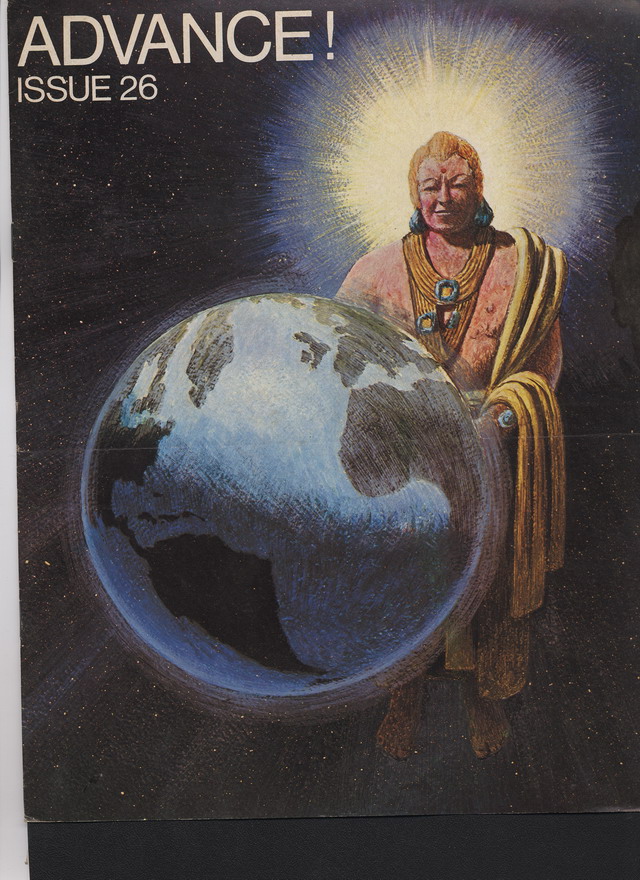Veda
Sponsor
Hubbard BEFORE OT3
From the Scientology lecture "The Hope of Man", L Ron Hubbard talks about Gautama Siddhartha Buddha.
[video=youtube;vzngYUP1jc4]http://www.youtube.com/watch?feature=player_embedded&v=vzngYUP1jc4[/video]
That lecture was given in 1954, around the time of Hubbard's activation of Scientology's "religion angle," as Hubbard called it.
In 1954, Hubbard had spoken publicly, respectfully, of Buddhism, and even of Taoism, and also of the Vedas.
He wanted to show that Scientology followed in the long tradition of these subjects, and even briefly spoke positively of Christianity. The 1954 'Creation of Human Ability' book opens with a quote from St. Luke of the Bible.
However, during the 1954 Phoenix Lectures, Hubbard couldn't resist depicting himself as being responsible (by implication) for the arrival of the Vedas on Earth, and at a much earlier date than usually recognized:
"It does happen that there are a set of [Vedic] hymns which as I recall were introduced into the societies of earth in about 8212 BC."
The next year, Hubbard wrote The 'Hymn of Asia', where he depicted himself as the re-incarnated Buddha. Seems as though not only did Hubbard originally bring this knowledge to Earth "in about 8212 BC," he also, as Gautama Buddha, continued to develop it and popularize it. However, such gloating and boasting was not meant for the "homo saps," as Hubbard called them, but for the "homo novis," the Scientologists, who were to regard it as special, whispered, inside information, meant only for the "elite of the elite" of Earth - namely themselves. In other words, while gratefully beholding the wonderfulness of Hubbard, Scientologists were allowed to respectfully participate in Hubbard's ego-bloat.
During 1955, Hubbard not only wrote his (meant for Scientologists' eyes only) "ruin utterly" and "always attack" 'Manual on Dissemination of Material'; he also wrote the fraudulent 'Russian Textbook on Psycho-politics' where he depicted Scientology as a target of the Russian Communists; and, also wrote the 'Hymn of Asia', where he depicted himself as the reincarnated Buddha.
It was quite a productive year.
By 1961, however, in a lecture (23 June 1961), Hubbard denounced Buddhism as a control mechanism devoted to keeping people quiet.
"And of course, how quiet can you get? Dead. And you just might say, it's a covert effort to kill everybody off," Hubbard told the Scientologists.
Yet, there was a back and forth on this, as Hubbard, when emphasizing his "religion angle," would abruptly mellow on ("wog") religions and become appropriately tolerant of them - when it suited his purposes.
Meanwhile, the 'Hymn of Asia' collected dust in a file cabinet or in a box somewhere, until, in the mid 1970s, it was revived and published.
An 'Advance!' magazine cover from 1974:


I can be addressed
But in our temples best
Address me and you address
Lord Buddha.
Address Lord Buddha
And you then address
Metteyya.

L. Ron Hubbard, from 'Hymn of Asia'
As with his predecessor Crowley, Hubbard had expressed some critical views of Buddhism. The last was during the Dianetic Clear frenzy of the late 1970s/early 1980s, when some Scientologists, certain that they had "gone Clear" as disciples of the Buddha (of course, believing Hubbard to have been Buddha, thus making it OK), were rebuffed by Hubbard when he told them, in no uncertain terms, that one "does not go Clear by garbage eating," i.e. by being Buddhist monks (with begging bowls.)
The poor Scientologists. It's not easy being a Scientologist and being at the mercy of the whims of "Source."
And for those Scientologists, and ex-Scientologists, who are still trying to "word clear," by studying actual Buddhism, the name or term, Metteyya... psst... it doesn't matter. It was something Hubbard made up to impress people.
Looking beneath Hubbard's various expressions of the religious cloaking PR, prior to his activation of the "religion angle," one finds Hubbard speaking to nascent Scientologists during the 1952 Philadelphia Doctorate Course:
"Our whole activity tends to make an individual completely independent of any limitation... Old Aleister Crowley had some interesting things to say about this. He wrote 'The Book of the Law'.

All editions of 'The Book of the Law' are blood red,
which is, oddly, also the color of the 'Tech Volumes'.
From Crowley's 'Magick in Theory and Practice':
"The whole and sole object of all true Magickal training is to become free from every kind of limitation."
More from the 'PDC':
"The old magical cults of the 8th, 9th, 10th, 11th, and 12th centuries in the Middle East were fascinating. The only modern work that has anything to do with them is a trifle wild in spots, but a fascinating work by itself, and that's the work of Aleister Crowley... He signs himself 'the Beast', mark of the Beast 666..."

Possibly the most honest moment, during the Philadelphia Lectures of late 1952, was at the very beginning of the first lecture, when Hubbard made an odd, non-sequitur, joke about being "the Prince of Darkness."
The audience of "thay-tans," listening attentively as they were promised God-like abilities and powers, chucked unsuspectingly.
It would be over thirty years before Hubbard's 'Affirmations' - written six years before the 1952 PDC lectures - and Hubbard's taste for "slaves," as expressed in those 'Affirmations', was revealed in a Southern California courtroom.
But that's another topic.

